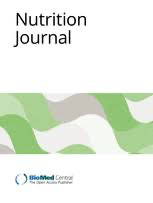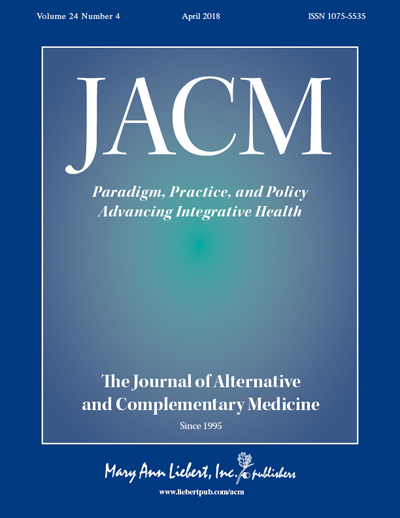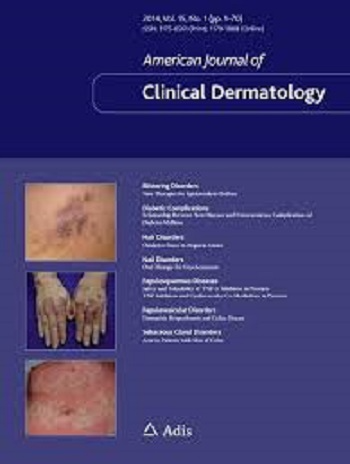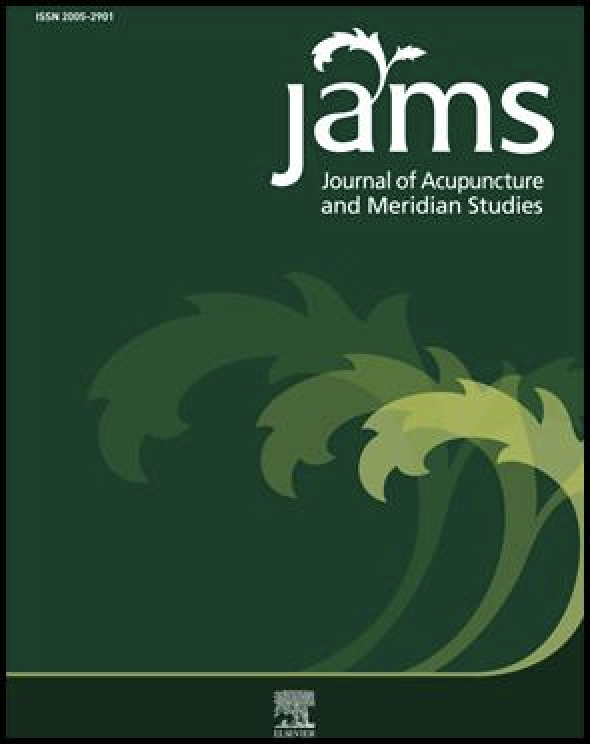Dermatitis
How to submit an article:
- Registered users can submit any published journal article that has a unique DOI (Digital Object Identifier) name or link to Research Hub.
- For example, you can paste the full DOI link:
https://doi.org/10.1109/5.771073or just the DOI name:10.1109/5.771073into the field above and click submit. - The person who is first to submit a valid article to Research Hub will forever be credited for it, and every article submission earns you +6 Research Points.
Related Topics
Published research studies are articles that present the findings of original research that has undergone a peer-review process and has been made publicly available in scholarly journals, books or other media.

Association of maternal ultra-processed food consumption during pregnancy with atopic dermatitis in infancy: Korean Mothers and Children’s Environmental Health (MOCEH) study
2024 Jun 25 Nutrition Journal Jang W, Kim M, Ha E, Kim H
Cohort Study Eczema Ultra-Processed FoodsHigher consumption of ultra-processed food by pregnant women was linked to an increased risk of infantile atopic dermatitis within the first year of life.

Anti-atopic dermatitis effect of a modified Huang-Lian-Jie-Du decoction and its active fraction on 2,4-dinitrobenzene and MC903-induced mouse models
2022 Sep Phytomedicine Wang L, Hu Z, Yang W, Loo SKF, Ip SP, Xian YF, et al.
This study reported for the first time that modified Huang-Lian-Jie-Du Decoction (MHLJDD) and its active fraction could be used as innovative therapeutic agents for atopic dermatitis (AD).
Animal Study Eczema
Efficacy and safety of Chinese herbal medicine for atopic dermatitis: Evidence from eight high-quality randomized placebo-controlled trials
2022 Sep 27 Frontiers in Pharmacology Cai X, Sun X, Liu L, Zhou Y, Hong S, Wang J, et al.
Systematic Review EczemaChinese herbal medicine (CHM) improved AD symptoms but had no significant impact on patients' quality of life or IgE levels suggesting CHM's potential as an AD treatment with further research.

The Efficacy and Safety of Acupuncture in the Treatment of Neurodermatitis: A Systematic Review and Meta-Analysis
2022 Sep 01 Evidence-Based Complementary and Alternative Medicine Yang L, Li X, Huang W, Li J, Rao X, Lai Y
Acupuncture is safe and effective in treating neurodermatitis.
Systematic Review Meta-Analysis Neurodermatitis
Tremella fuciformis polysaccharides alleviate induced atopic dermatitis in mice by regulating immune response and gut microbiota
2022 Aug 25 Frontiers in Pharmacology Xie L, Yang K, Liang Y, Zhu Z, Yuan Z, Du Z
Experimental Study Animal Study Polysaccharides Gut Microbiota Eczema Snow FungusOral administration of Tremella fuciformis polysaccharides may constitute a new, effective therapy for Atopic dermatitis, improving both immune response and intestinal microbiota.
Research insights are moderated by the Research Hub team and offer an at-a-glance overview of interesting research findings.

2024 Nutrition Journal
Higher consumption of ultra-processed food by pregnant women was linked to an increased risk of infantile atopic dermatitis within the first year of life.
Cohort Study Eczema Ultra-Processed Foods
Association of maternal ultra-processed food consumption during pregnancy with atopic dermatitis in infancy: Korean Mothers and Children’s Environmental Health (MOCEH) study
Jang W, Kim M, Ha E, Kim H

2022 Frontiers in Pharmacology
Chinese herbal medicine (CHM) improved AD symptoms but had no significant impact on patients' quality of life or IgE levels suggesting CHM's potential as an AD treatment with further research.
Systematic Review Eczema
Efficacy and safety of Chinese herbal medicine for atopic dermatitis: Evidence from eight high-quality randomized placebo-controlled trials
Cai X, Sun X, Liu L, Zhou Y, Hong S, Wang J, et al.

2022 Frontiers in Pharmacology
Oral administration of Tremella fuciformis polysaccharides may constitute a new, effective therapy for Atopic dermatitis, improving both immune response and intestinal microbiota.
Experimental Study Eczema Gut Microbiota Polysaccharides Snow Fungus
Tremella fuciformis polysaccharides alleviate induced atopic dermatitis in mice by regulating immune response and gut microbiota
Xie L, Yang K, Liang Y, Zhu Z, Yuan Z, Du Z

2021 Frontiers in Nutrition
Processed food consumption, particularly pickles and processed meats, is linked with atopic dermatitis in Chinese adults.
Cohort Study Eczema Ultra-Processed Foods
Processed Food and Atopic Dermatitis: A Pooled Analysis of Three Cross-Sectional Studies in Chinese Adults
Li Y, Su J, Luo D, Duan Y, Huang Z, He M, et al.

2021 The Journal of Alternative and Complementary Medicine
Acupuncture improves clinical outcomes in uremic pruritus, atopic dermatitis, urticaria, and itch.
Systematic Review
Acupuncture in Dermatology: An Update to a Systematic Review
Hwang J, Lio PA
Review Articles
Review articles summarise and critically evaluate the current state of research on a specific topic or field by synthesising multiple primary research studies.

Efficacy and safety of Chinese herbal medicine for atopic dermatitis: Evidence from eight high-quality randomized placebo-controlled trials
2022 Sep 27 Frontiers in Pharmacology Cai X, Sun X, Liu L, Zhou Y, Hong S, Wang J, et al.
Systematic Review EczemaChinese herbal medicine (CHM) improved AD symptoms but had no significant impact on patients' quality of life or IgE levels suggesting CHM's potential as an AD treatment with further research.

The Efficacy and Safety of Acupuncture in the Treatment of Neurodermatitis: A Systematic Review and Meta-Analysis
2022 Sep 01 Evidence-Based Complementary and Alternative Medicine Yang L, Li X, Huang W, Li J, Rao X, Lai Y
Acupuncture is safe and effective in treating neurodermatitis.
Systematic Review Meta-Analysis Neurodermatitis
Acupuncture in Dermatology: An Update to a Systematic Review
2021 Jan 01 The Journal of Alternative and Complementary Medicine Hwang J, Lio PA
Systematic ReviewAcupuncture improves clinical outcomes in uremic pruritus, atopic dermatitis, urticaria, and itch.

Effectiveness and Safety of Herbal Medicine for Atopic Dermatitis: An Overview of Systematic Reviews
2020 Jul 17 Evidence-Based Complementary and Alternative Medicine Kwon CY, Lee B, Kim S, Lee J, Park M, Kim N
The results suggested that herbal medicine (HM) as a monotherapy or an adjunctive therapy is promising for the treatment of atopic dermatitis (AD).
Review Article Eczema
Phellodendri Cortex: A Phytochemical, Pharmacological, and Pharmacokinetic Review
2019 Apr 01 Evidence-Based Complementary and Alternative Medicine Sun Y, Lenon GB, Yang AWH
The compounds of the crude bark of PC and its subspecies have showcased a wide range of pharmacological effects. Pharmacological efficacies of PC are supported by its diverse class of alkaloid, limonoid, phenolic acid, quinic acid, lignan, and flavonoid. Obacunone and obaculactone could be the bioactive compounds for atopic dermatitis management. PC and its subspecies are generally safe to use but extra care is required for certain conditions and group of people.
Review Article Huang BaiClinical Trials
Clinical trials are research studies that involve people and are conducted to evaluate the safety and efficacy of new treatments or interventions, such as drugs, medical devices, or behavioural therapies.

Efficacy and safety of indigo naturalis ointment in Treating Atopic Dermatitis: A randomized clinical trial
2020 Mar Journal of Ethnopharmacology Lin YK, Chang SH, Yang CY, See LC, Lee BH, Shih IH
Indigo naturalis ointment is effective for treating mild to severe atopic dermatitis (AD) topically, and appears to be safe. This is the first clinical trial to provide evidence supporting topical indigo-based AD treatment.
Randomised Controlled Trial
Acupuncture improves symptoms in patients with mild-to-moderate atopic dermatitis: A randomized, sham-controlled preliminary trial
2018 Mar 4 Complementary Therapies in Medicine Smith CA, Armour M, Lee MS, Wang LQ, Hay PJ
Randomised Controlled Trial Eczema Skin ConditionsAcupuncture may improve symptoms in patients with mild-to-moderate atopic dermatitis.

Efficacy of a Chinese herbal medicine for the treatment of atopic dermatitis: A randomised controlled study
2015 Oct Complementary Therapies in Medicine Liu J, Mo X, Wu D, Ou A, Xue S, Liu C, et al.
Pei Tu Qing Xin Tang (PTQXT) is effective in decreasing the severity of the disease and improving the quality of life (QOL) in patients with moderate-to-severe atopic dermatitis (AD).
Randomised Controlled Trial Pei Tu Qing Xin TangStudy Protocols
Published study protocols are detailed plans that outline the objectives, methodology, statistical analyses, and organisation of a research study that have been made publicly available for others to review and use as a reference.

The efficacy and safety of Longmu Tang granule for the treatment of atopic dermatitis: study protocol for a single-centred, double-blinded, randomised, placebo-controlled trial
2022 May 09 BMC Complementary Medicine and Therapies Li Y, Shen T, Wang Q, Ma M, Tian F, She Y, et al.
The results of this trial will provide evidence of the efficacy and safety of the Longmu Tang granule and prove its anti-inflammatory action in patients with atopic dermatitis (AD).
Study Protocol Eczema
The herbal drug, Bu-Zhong-Yi-Qi-Tang, for the treatment of atopic dermatitis
2019 Jan Medicine Jeong MK, Kim YE, Kim A, Jung J, Son MJ
Thus, in this study, we will investigate the clinical evidence related to the effectiveness of Bu-Zhong-Yi-Qi-Tang (BZYQT) for treating atopic dermatitis (AD).
Study Protocol EczemaPresentation Slides

Cohort Study
Higher consumption of ultra-processed food by pregnant women was linked to an increased risk of infantile atopic dermatitis within the first year of life.
Jang W, Kim M, Ha E, Kim H

Systematic Review
Chinese herbal medicine (CHM) improved AD symptoms but had no significant impact on patients' quality of life or IgE levels suggesting CHM's potential as an AD treatment with further research.
Cai X, Sun X, Liu L, Zhou Y, Hong S, Wang J, Chen J, Zhang M, Wang C, Lin N, Li S, Xu R, Li X

Experimental Study
Oral administration of Tremella fuciformis polysaccharides may constitute a new, effective therapy for Atopic dermatitis, improving both immune response and intestinal microbiota.
Xie L, Yang K, Liang Y, Zhu Z, Yuan Z, Du Z

Cohort Study
Processed food consumption, particularly pickles and processed meats, is linked with atopic dermatitis in Chinese adults.
Li Y, Su J, Luo D, Duan Y, Huang Z, He M, Tao J, Xiao S, Xiao Y, Chen X, Shen M

Systematic Review
Acupuncture improves clinical outcomes in uremic pruritus, atopic dermatitis, urticaria, and itch.
Hwang J, Lio PA

Randomised Controlled Trial
Acupuncture may improve symptoms in patients with mild-to-moderate atopic dermatitis.
Smith CA, Armour M, Lee MS, Wang LQ, Hay PJ

Systematic Review
There is at least some level I evidence to support the use of acupuncture and acupressure as adjuncts to conventional treatment of atopic dermatitis.
Vieira BL, Lim NR, Lohman ME, Lio PA.

Systematic Review
Acupuncture improves outcome measures in the treatment of dermatitis, chloasma, pruritus, urticaria, hyperhidrosis, and facial elasticity.
Ma, C., & Sivamani, R. K.

Experimental Study
The extract from Chrysanthemum Indicum Linné effectively reduces inflammation in mouse skin when induced, hinting at potential therapeutic applications for immune-related skin diseases.
Lee DY, Choi G, Yoon T, Cheon MS, Choo BK, Kim HK
Executive Summary
Write an executive summary in the form of a blog article on the topic of "Research into Chinese medicine treatment for Dermatitis" summarising the research below and using language that can be easily understood by patients and avoiding medical jargon using a professional and caring tone of voice.
Write an executive summary in the form of a blog article on the topic of "Researched Chinese medicine treatments for Dermatitis" summarising the research below in an objective and easy to understand way, and using language that can be easily understood by patients. Group the article into Chinese medicine treatments first, followed by nutrition and other treatments. Avoid using medical jargon and use a professional and caring tone of voice.
Write me a concise but easy to understand executive summary on the topic of "Chinese medicine treatments for Dermatitis" based on the following research that I will give you. Your summary should be 2 paragraphs long in Australian English spelling and include references to the studies.
A Cohort Study published in 2024 in the journal Nutrition Journal found that Higher consumption of ultra-processed food by pregnant women was linked to an increased risk of infantile atopic dermatitis within the first year of life. The research used 861 pairs of pregnant women and their offspring from the Mothers' and Children's Environmental Health project in Korea. These women’s dietary intake was measured using the 24-hour recall method during 12-28 weeks gestation. Foods were classified as ultra-processed following the NOVA classification and their consumption was calculated as the proportion of total energy intake, with participants categorized into quartiles. The prevalence of infantile atopic dermatitis was assessed based on their medical histories and according to the International Study of Asthma and Allergies in Childhood criteria. The results revealed that children born to mothers in the highest quartile of ultra-processed food consumption, compared to the lowest quartile, showed a higher risk towards atopic dermatitis within 12 months. This relationship became stronger after adjusting for certain confounding variables. Additionally, the link stayed consistent even after adjusting based on the Korean Healthy Eating Index, which measures diet quality.
A Systematic Review published in 2022 in the journal Frontiers in Pharmacology found that Chinese herbal medicine (CHM) improved AD symptoms but had no significant impact on patients' quality of life or IgE levels suggesting CHM's potential as an AD treatment with further research. CHM showed benefits in improving AD symptoms, such as itching and skin appearance, compared to placebos. However, it didn't significantly affect patients' quality of life or IgE levels. CHM was safe, with only minor side effects. These findings suggest CHM could be a useful treatment for AD, but more standard guidelines are needed due to variations in herbal ingredients and dosages in different studies.
A Experimental Study published in 2022 in the journal Frontiers in Pharmacology found that Oral administration of Tremella fuciformis polysaccharides may constitute a new, effective therapy for Atopic dermatitis, improving both immune response and intestinal microbiota. In the methodology of this study, the therapeutic effects of Tremella fuciformis polysaccharides (these have multiple biological activities), on Atopic dermatitis, were examined through both topical application and oral administration on mice induced with Atopic dermatitis-like disorder. The changes across transdermal water loss, epidermal thickening, and ear edema in the affected mice were observed. Notably, the study also considered the polysaccharides' impacts on the proportion of specific regulatory T cells in the mesenteric lymph nodes of the mice. The results showed that both therapeutic methods positively impacted the conditions of the affected mice, with oral administration offering superior efficacy over topical application. The oral administration of the polysaccharides led to an increase of specific regulatory T cells, evidence of immune regulation. Further, non-targeted metabolomics and sequencing of certain DNA amplicons pointed towards observable modulation in fecal metabolites and a changed composition of gut microbiota in the mice following the oral treatment.
A Cohort Study published in 2021 in the journal Frontiers in Nutrition found that Processed food consumption, particularly pickles and processed meats, is linked with atopic dermatitis in Chinese adults. This study involved a series of three cross-sectional studies that used cluster sampling across different locales, including villages, institutions, and factories. Subjects from different socio-economic and occupational backgrounds, including rural residents, civil servants, and factory workers, were subjected to dermatological evaluations by certified dermatologists. Alongside this, they responded to a food frequency questionnaire designed to understand their regular dietary habits. A spot urine sample was also taken from each participant to get an accurate measure of their daily sodium intake. The analysis of results showed a significant association between atopic dermatitis and the consumption of certain processed foods - specifically, pickles and processed meats. It was found that people consuming pickles and processed meats 1-3 times a week were more likely to develop atopic dermatitis compared to individuals who rarely or never consumed these foods. Furthermore, a strong correlation was observed between higher sodium intake and the incidence of atopic dermatitis. The trend shows a dose-dependent relationship, meaning that as the intake of these specific processed foods, and sodium increased, so did the chances of coming down with atopic dermatitis.
A Systematic Review published in 2021 in the journal The Journal of Alternative and Complementary Medicine found that Acupuncture improves clinical outcomes in uremic pruritus, atopic dermatitis, urticaria, and itch. A systematic review published in 2015 found that acupuncture improves outcomes in several dermatological diseases. We performed a systematic review of studies that have been done since then to present updated evidence. Results showed that acupuncture improves clinical outcomes in uremic pruritus, atopic dermatitis, urticaria, and itch. Acupuncture does not significantly reduce postoperative itch in patients undergoing cesarean section under spinal anesthesia. While there are some promising studies that support the use of acupuncture for skin diseases, additional large-scale, randomized, sham-controlled trials need to be performed to present consistent high-level evidence of acupuncture's role in dermatology.
A Randomised Controlled Trial published in 2018 in the journal Complementary Therapies in Medicine found that Acupuncture may improve symptoms in patients with mild-to-moderate atopic dermatitis. The SCORing Atopic Dermatitis (SCORAD), VAS (Pruritus), VAS (Insomnia), Patient Oriented Eczema Measure (POEM), Dermatology Life Quality Index (DLQI), and Eczema Area and Severity Index (EASI) were significantly improved in the real acupuncture groups.
A Systematic Review published in 2016 in the journal American Journal of Clinical Dermatology found that There is at least some level I evidence to support the use of acupuncture and acupressure as adjuncts to conventional treatment of atopic dermatitis. There is at least some level I evidence to support the use of acupuncture and acupressure, stress-reducing techniques such as hypnosis, massage, and biofeedback, balneotherapy, herbal preparations (with many important caveats), certain botanical oils, oral evening primrose oil, vitamin D supplementation, and topical vitamin B12. Many other therapies either have sufficient data to suggest that they are ineffective, or simply do not have enough evidence to formulate a verdict.
A Systematic Review published in 2015 in the journal Journal of Acupuncture and Meridian Studies found that Acupuncture improves outcome measures in the treatment of dermatitis, chloasma, pruritus, urticaria, hyperhidrosis, and facial elasticity. Twenty-four studies met inclusion criteria. Among these, 16 were randomized controlled trials, 6 were prospective observational studies, and 2 were case reports. Acupuncture was used to treat atopic dermatitis, urticaria, pruritus, acne, chloasma, neurodermatitis, dermatitis herpetiformis, hyperhidrosis, human papillomavirus wart, breast inflammation, and facial elasticity. In 17 of 24 studies, acupuncture showed statistically significant improvements in outcome measurements compared with placebo acupuncture, alternative treatment options, and no intervention.
A Experimental Study published in 2009 in the journal Journal of Ethnopharmacology found that The extract from Chrysanthemum Indicum Linné effectively reduces inflammation in mouse skin when induced, hinting at potential therapeutic applications for immune-related skin diseases. To investigate the effects of Chrysanthemum Indicum Linné extract (CIE) on skin inflammation, the study first prepared a 70% ethanolic extract of the plant. The investigation was conducted in vivo using mice. Researchers then measured the production of pro-inflammatory cytokines, the activation of myeloperoxidase, and conducted histological assessments. They induced acute and chronic skin inflammation in the mice using 12-O-tetradecanoyl-phorbol-13-acetate, a substance known to cause mouse ear edema. In understanding the results, they found that administering CIE inhibited topical edema in the mouse's ear, following administration at a dose of 200mg/kg. This resulted in significant reductions in skin thickness, tissue weight, inflammatory cytokine production, and neutrophil-mediated myeloperoxidase activity. The extract was also found to be effective at reducing various histopathological indicators, as well as inflammatory damage induced by chronic exposure to the inflammation-inducing substance. The study, therefore, concludes that CIE could be an effective anti-inflammatory agent and may have therapeutic potential for various immunity-related skin diseases.
Moderation Tools
Topic
Sign In
Users not signed in are limited to viewing the 5 most recent items of content.